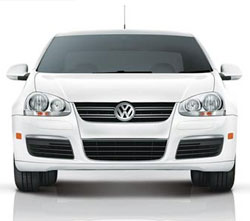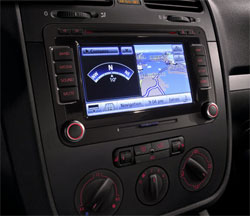2009 Volkswagen Jetta TDI
Erratic gas prices have everyone wondering about the future of the automobile and what can be done to make them more efficient. But this week, we want to focus on fuel saving technologies and tips that can help ease the pain at the pump right now. So let’s start with a road test of the first modern 50-state legal diesel car to go on sale in America: the clean, quiet, and thrifty Volkswagen Jetta TDI.
With the words “clean” and “diesel” now living in happy coexistence, Volkswagen fans are celebrating the introduction of the 2009 Jetta TDI Sedan and the Jetta TDI SportWagen. Both get their 50-state legal diesel power from Volkswagen’s newest TDI engine; a 2.0-liter turbocharged 16-vale 4-cylinder with common rail direct injection. In 2009 trim, VW’s compact diesel makes 140 horsepower and 236 pound-feet of torque. Compared to the Jetta’s standard 2.5-liter gas engine, the diesel delivers 30 horsepower less, but at 33% more pulling power torque.
 While VW is part of the BlueTec diesel cooperative with Mercedes, the Jetta’s TDI 4 does not use the urea injection found on Mercedes new BlueTec SUV V6 to handle Nitrogen Oxide emissions. Rather a NOx trap is used, as well as particulate filter for soot. Both are then burned off periodically.
While VW is part of the BlueTec diesel cooperative with Mercedes, the Jetta’s TDI 4 does not use the urea injection found on Mercedes new BlueTec SUV V6 to handle Nitrogen Oxide emissions. Rather a NOx trap is used, as well as particulate filter for soot. Both are then burned off periodically.
Other advanced hardware includes a high pressure pump that feeds fuel to Bosch piezo-controlled injectors. They deliver a fine multi-stage spray for a more complete combustion. The end result is emission levels comparable to those of a similar size gasoline engine.
But like all diesels, the TDI easily beats gas engines in the mileage contest, earning government fuel economy ratings of 30 city/41 highway with a manual transmission, and 29 city/40 highway with an automatic. This gives the Jetta TDI an Energy Impact Score of only 11.6 barrels of oil per year, and a small 6.2 carbon footprint.
Our seat of the pants testing using an automatic Jetta’s onboard mileage computer delivered a result of 40.7 miles-per-gallon of low sulfur diesel fuel, and that was on the often steep twisting pavement of LA’s Mulholland Drive. Transmitting this cleaner diesel’s power to the Jetta’s front wheels are either a 6-speed manual gearbox or a DSG direct-shift automatic with sequential manual mode.
From the very beginning of our drive, we were impressed with the TDI’s prodigious torque. Even on Mulholland’s many tight twists and turns, we rarely had to downshift the manual from fifth gear. The automatic transmission didn’t work much harder, its infrequent shifts being clean and fuss free. The TDI engine is also very smooth and remarkably quiet. The day of the clattering dirty diesel is truly gone.
But while the Jetta’s TDI engine was a revelation, the carry-over chassis is a proven package. The ride is smooth, and quiet under all kinds of conditions. But the TDI suspension is tuned soft, so there’s a good bit of front push in tight corners.
 We expect few drivers to complain about the TDI’s very well equipped interior. As always, the Volkswagen layout is simple and clean, with a full compliment of airbags standard.
We expect few drivers to complain about the TDI’s very well equipped interior. As always, the Volkswagen layout is simple and clean, with a full compliment of airbags standard.
The front seats feature V-Tex’s faux leather upholstery, 8-way adjustments, and heat. While the center stack packs manual single-zone climate controls. The rear seat delivers good head room, but limited space for adult legs or elbows. No such issues with the trunk however, which measures a big 16 cubic-feet.
Jetta TDI Sedan prices start at $22,640 with a manual and $23,740 for the DSG automatic. That’s only about $2,100 more than a comparably equipped petrol powered Jetta SE. The TDI SportWagen starts at $24,240 for the manual, and $25,340 for the automatic. But since many TDI buyers will be able to claim a $1,300 Federal Income Tax Credit, the only real obstacle to TDI ownership is the price of the clean diesel fuel itself.
The 2009 Volkswagen Jetta TDI is just what diesel fans have been waiting for, and what the driving population as a whole needs. A totally practical and affordable diesel alternative to the typical compact family car. The TDI is a no-compromise effort, and one that can take American drivers a long way towards their own personal brand of energy independence.
Specifications
- Engine: 2.0-Liter Turbocharged 16-vale 4-Cylinder
- Horsepower: 140
- Torque: 236 Lb Feet
- EPA: 29 MPG City/ 40 MPG Highway
- Energy Impact: 11.6 Barrels Oil/Yr
- CO2 Emissions: 6.2 Tons/Yr






